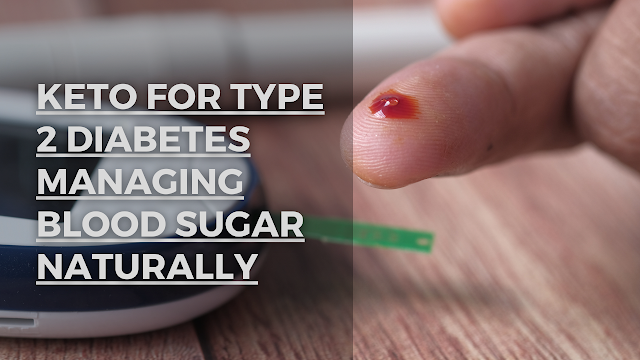Keto for Type 2 Diabetes Managing Blood Sugar Naturally ,In today's fast-paced world, health is a top priority for many. One condition that has been on the rise is Type 2 diabetes, a chronic metabolic disorder characterized by high blood sugar levels. Managing blood sugar naturally has become a popular goal, and the ketogenic diet, often referred to as "keto," has gained attention as a potential solution. In this comprehensive guide, we'll explore the ins and outs of using keto for managing Type 2 diabetes and keeping blood sugar levels in check.
"Your Keto success story starts here! Head over to Keto Lifestyle Hub for personalized diet plans and effective weight loss supplements. Let's achieve your goals together!"
Introduction
Managing Type 2 diabetes can be a challenging journey, but it's essential for overall well-being. While there are various approaches to managing this condition, the keto diet offers a unique perspective. In this article, we will delve into the world of keto for Type 2 diabetes, examining its effectiveness, benefits, and potential drawbacks.
The Basics of Keto
Before we dive deeper into using keto for managing Type 2 diabetes, let's understand the fundamentals of this diet.
What is Keto?
The keto diet is a low-carbohydrate, high-fat eating plan designed to put the body into a state of ketosis. Ketosis is a metabolic state where the body primarily uses fat for energy instead of carbohydrates. By drastically reducing carbohydrate intake, the body starts to burn fat for fuel, including stored fat, which can lead to weight loss.
How Does Keto Work?
When you consume very few carbs, your body's insulin levels drop. Insulin is a hormone that regulates blood sugar levels by helping cells absorb glucose. Lower insulin levels mean that blood sugar remains stable, reducing the risk of blood sugar spikes and crashes.
Keto for Type 2 Diabetes
Now, let's explore how the keto diet can specifically benefit individuals with Type 2 diabetes.
#Blood Sugar Control
One of the primary advantages of keto for Type 2 diabetes is its ability to control blood sugar levels effectively. By minimizing carbohydrate intake, the diet reduces the need for insulin, helping to prevent dramatic blood sugar fluctuations.
# Weight Loss
Obesity is a significant risk factor for Type 2 diabetes. The keto diet's focus on fat as the primary energy source can lead to substantial weight loss, potentially reversing or improving the condition.
#Improved Insulin Sensitivity
Keto has been shown to enhance insulin sensitivity, allowing the body to use insulin more effectively. This can help individuals with Type 2 diabetes manage their condition more efficiently.
#Reducing Medication Dependency
Some people with Type 2 diabetes may be able to reduce their medication or insulin requirements when following a keto diet. However, this should always be done under medical supervision.
#Getting Started with Keto
If you're considering using keto to manage Type 2 diabetes, it's essential to start gradually and consult with a healthcare professional. Here are some steps to get you started:
# Consult Your Healthcare Provider
Before making any significant dietary changes, consult your doctor or a registered dietitian. They can provide guidance tailored to your specific health needs.
# Plan Your Meals
Create a meal plan that aligns with keto principles. Focus on foods rich in healthy fats, such as avocados, nuts, and olive oil, and low-carb vegetables like leafy greens.
# Monitor Your Blood Sugar
Regularly check your blood sugar levels to track how the keto diet is affecting you. This will help you and your healthcare provider make necessary adjustments.
#Stay Hydrated
Keto can lead to increased water loss, so make sure to stay well-hydrated by drinking plenty of water throughout the day.
# Be Patient
Adjusting to a new way of eating takes time. Be patient with yourself and give your body the chance to adapt to the keto diet.
### Frequently Asked Questions
#### Can anyone with Type 2 diabetes try keto?
Keto may not be suitable for everyone with Type 2 diabetes. It's crucial to consult with a healthcare provider to determine if it's a safe option for you.
#### Is the keto diet sustainable in the long term?
The sustainability of the keto diet varies from person to person. Some find it sustainable and enjoyable, while others may struggle with the strict restrictions on carbohydrates.
#### Are there any potential side effects of the keto diet for Type 2 diabetes?
Common side effects of keto can include keto flu, constipation, and nutrient deficiencies. It's essential to address these issues and monitor your health closely.
#### How quickly can I expect to see improvements in my blood sugar levels on keto?
The timeline for improvement varies, but some individuals experience positive changes in blood sugar levels within weeks of starting the keto diet.
#### Can I cheat on the keto diet occasionally?
While occasional indulgences are possible, it's essential to be mindful of the potential impact on blood sugar and overall progress.
#### Should I take supplements on the keto diet?
Supplements may be necessary to address nutrient deficiencies, but consult your healthcare provider before adding any supplements to your diet.
 |
"Your Keto success story starts here! Head over to Keto Lifestyle Hub for personalized diet plans and effective weight loss supplements. Let's achieve your goals together!"
### Conclusion
Keto for Type 2 diabetes offers a promising approach to managing blood sugar naturally. By understanding the principles of the keto diet and consulting with healthcare professionals, individuals can embark on this journey towards better health. Remember, the key is consistency, patience, and monitoring your progress closely.
Incorporating keto into your lifestyle can be a positive step towards effectively managing Type 2 diabetes and achieving better overall well-being.
## The Importance of Lifestyle Factors
While the keto diet can be a valuable tool in managing Type 2 diabetes, it's crucial to recognize that lifestyle factors also play a significant role in overall health. Here are some additional considerations:
#### Exercise Regularly
Incorporating regular physical activity into your routine can enhance the effectiveness of the keto diet and improve insulin sensitivity. Consult with your healthcare provider to develop a safe and suitable exercise plan.
#### Manage Stress
High stress levels can adversely affect blood sugar control. Practicing stress-reduction techniques like meditation, yoga, or deep breathing exercises can be beneficial.
#### Get Quality Sleep
Adequate sleep is essential for maintaining hormonal balance and supporting overall health. Strive for seven to nine hours of quality sleep each night.
#### Stay Informed
Stay informed about the latest developments in diabetes management and keto diet research. Knowledge is a powerful tool for making informed decisions about your health.
### Exploring Keto-Friendly Foods
To successfully follow the keto diet for Type 2 diabetes, it's essential to familiarize yourself with foods that are both nutritious and low in carbohydrates. Here's a list of keto-friendly options:
- **Lean Proteins:**
Include sources like chicken, turkey, fish, and lean cuts of beef or pork in your diet.
- **Healthy Fats:**
Avocado, olive oil, coconut oil, and nuts are excellent sources of healthy fats that can help you stay in ketosis.
- **Low-Carb Vegetables:**
Leafy greens, broccoli, cauliflower, and zucchini are low in carbohydrates and rich in essential nutrients.
- **Berries:**
Small servings of berries like strawberries, raspberries, and blueberries can satisfy your sweet cravings without causing significant spikes in blood sugar.
- **Dairy:**
Choose full-fat dairy products like cheese, butter, and Greek yogurt, which are low in carbs.
- **Sweeteners:**
If you crave something sweet, consider using sugar substitutes like stevia or erythritol in moderation.
### Tracking Your Progress
To ensure that the keto diet is effectively managing your Type 2 diabetes, it's vital to keep track of your progress. Here are some steps to help you monitor your journey:
#### Maintain a Food Journal
Record your daily food intake, including portion sizes and carbohydrate counts. This journal can help you identify trends and make necessary adjustments.
#### Regularly Test Blood Sugar
Frequent blood sugar testing will provide insights into how the diet is affecting your glucose levels. Share these results with your healthcare provider.
#### Measure Ketone Levels
Invest in a ketone meter to monitor your ketone levels. This can confirm whether you are in ketosis, which is the goal of the keto diet.
#### Adjust as Needed
If you notice any unexpected changes in your blood sugar or ketone levels, consult with your healthcare provider and make adjustments to your diet accordingly.
### Potential Drawbacks and Considerations
While the keto diet offers promising benefits for managing Type 2 diabetes, it's essential to be aware of potential drawbacks and considerations:
- **Keto Flu:**
Some individuals may experience flu-like symptoms when transitioning to the keto diet. These symptoms are temporary and can be managed with adequate hydration and electrolyte supplementation.
- **Nutrient Deficiencies:**
The strict nature of the keto diet can lead to nutrient deficiencies. Consider taking supplements, as recommended by your healthcare provider, to address these deficiencies.
- **Personalized Approach:**
What works for one person may not work for another. It's essential to tailor the keto diet to your individual needs and preferences.
### Conclusion
Incorporating the keto diet into your strategy for managing Type 2 diabetes can be a powerful tool. However, it's essential to approach it with caution, informed decision-making, and the guidance of healthcare professionals. By combining the principles of keto with a holistic approach to health, you can take significant steps towards effectively managing your blood sugar levels naturally.
“My Blood Sugar Stabilized… Thanks To This Herb!”
















0 Comments